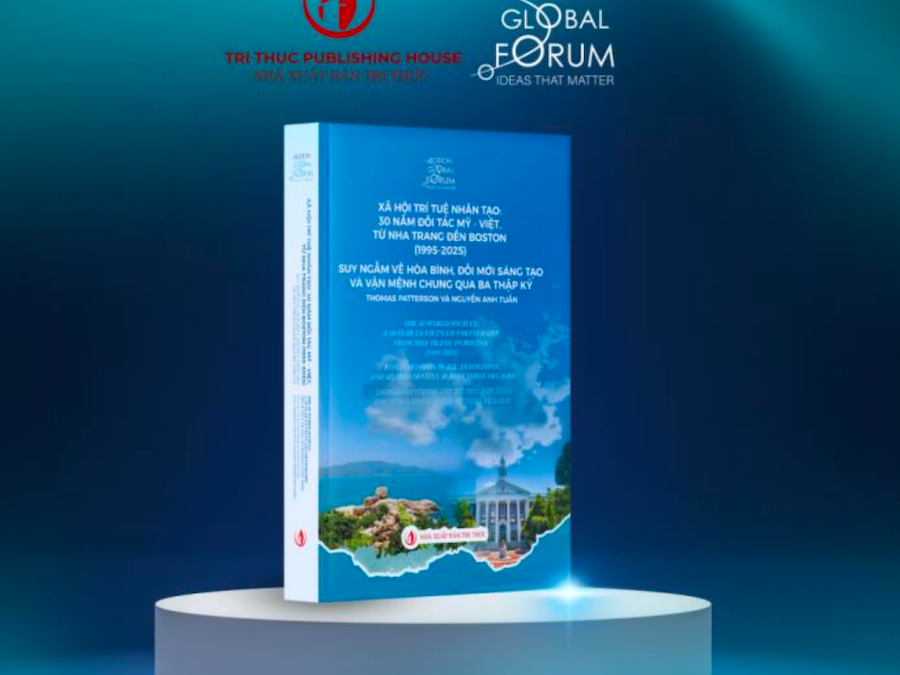
by Editor BGF | Oct 20, 2025 | News
BGF and Tri Thuc Publishing House Celebrate 30 Years of U.S.–Vietnam Partnership and the Vision of AIWS
Boston, USA / Hanoi, Vietnam – October 18, 2025
The Boston Global Forum (BGF) and Tri Thuc Publishing House (Vietnam) proudly announce the official publication of “The AI World Society: A 30-Year U.S.–Vietnam Partnership from Nha Trang to Boston (1995–2025)”, authored by Nguyen Anh Tuan, Co-Founder and CEO of BGF, and Professor Thomas Patterson of Harvard University, with a foreword by Governor Michael Dukakis, Co-Founder and Chair of BGF.
The book is published in both English and Vietnamese, marking a milestone in the cultural and intellectual journey celebrating 30 years of normalized relations between the United States and Vietnam (1995–2025).
This landmark work reflects on how the U.S.–Vietnam partnership has evolved from reconciliation to innovation — symbolized through the birth of the AI World Society (AIWS), a vision for a peaceful, ethical, and human-centered world in the Age of Artificial Intelligence.
At a special session of the Boston Global Forum Conference honoring the 10 Years of the World Leader for Peace and Security Award at Harvard University Faculty Club on November 3, 2025, Ms. Bui Thi Thu Hang, Editor-in-Chief of Tri Thuc Publishing House, will deliver a keynote introducing Tri Thuc’s World Knowledge Elite Collection (Tủ sách Tinh hoa Tri thức Thế giới) and the new publication.
Ms. Bui Thi Thu Hang shared:
“Vietnam is proud to have a pioneer like Nguyen Anh Tuan — Co-Founder of the AI World Society — who, together with leaders of advanced nations and distinguished thinkers from Harvard and MIT, has built a transformative political, social, and economic model of AI for humanity.”
Governor Michael Dukakis remarked:
“The Boston Global Forum will support Tri Thuc Publishing House, one of Vietnam’s leading publishers, in bringing the knowledge and intellectual contributions of distinguished U.S. thinkers and innovators to Vietnam through its World Knowledge Elite Collection. Together, we will also issue AIWS Esteemed Digital Assets to realize the AI World Society.”
This publication stands as both a cultural and intellectual milestone, celebrating the spirit of peace, partnership, and shared enlightenment between Vietnam and the United States — a relationship that has evolved from former adversaries to comprehensive strategic partners, serving as a model of reconciliation in global history.
Contact:
📧 [email protected]
📧 [email protected]
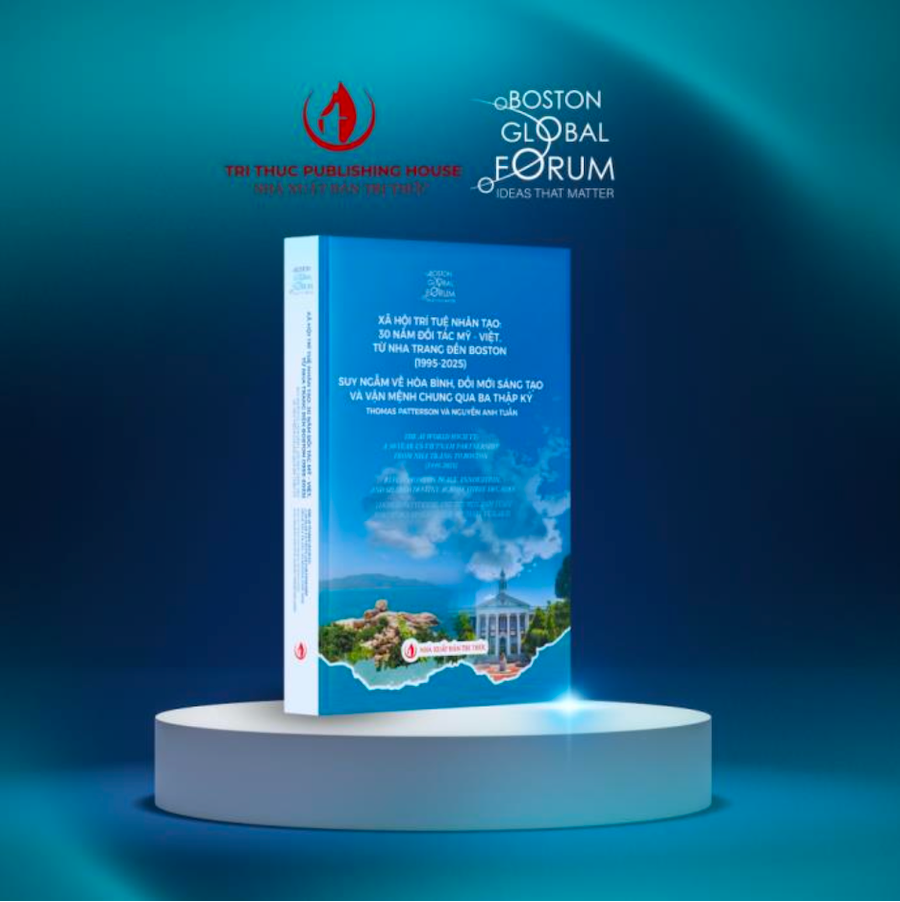
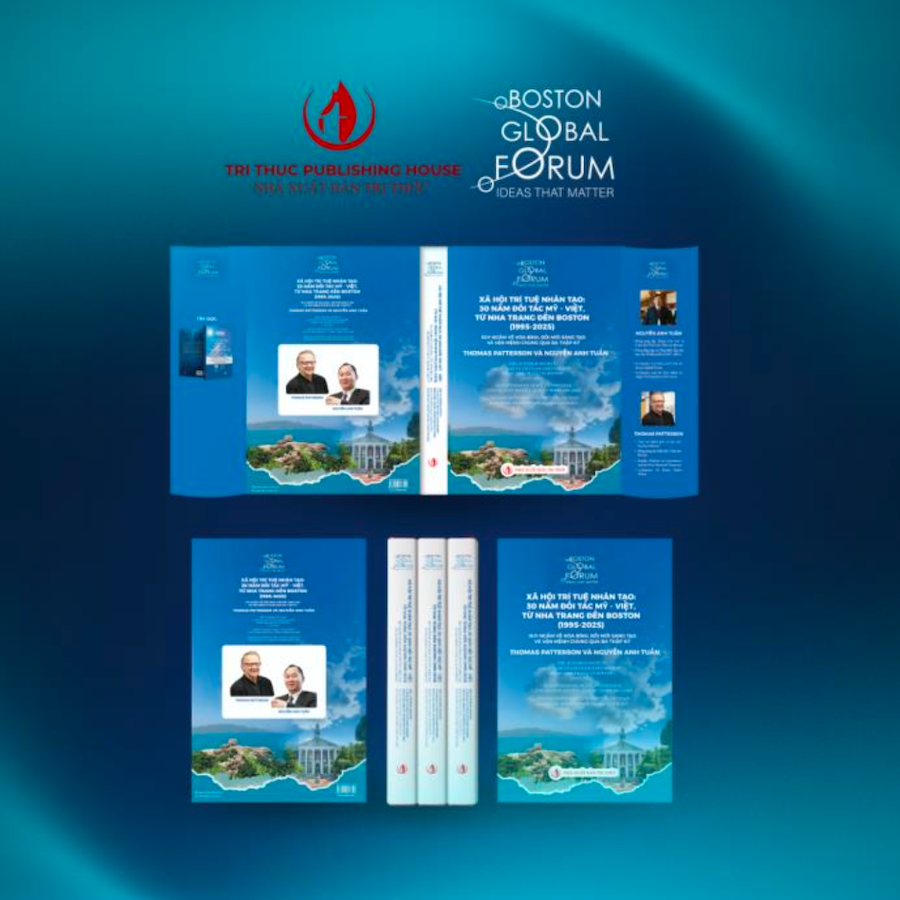

by Editor BGF | Oct 19, 2025 | Papers & Reports, Publications
As the world enters a new era shaped by artificial intelligence, digital currencies, and blockchain economies, the need for ethical governance and trusted value systems has never been more urgent. To meet this challenge, the Boston Global Forum (BGF) — through its pioneering initiative, the AI World Society (AIWS) — has launched the AIWS Digital Asset Standards Initiative (AIWS-DASI).
Purpose and Vision
AIWS-DASI redefines the meaning of digital assets in the AI Age. Beyond speculation or currency, digital assets are understood as new embodiments of human achievement — representing knowledge, creativity, trust, and the collective progress of civilization.
The initiative envisions a future where every digital asset is ethically designed, transparently managed, and socially valuable, serving as a tool for peace, sustainability, and global cooperation rather than exploitation or manipulation.
Framework and Methodology
AIWS-DASI establishes a three-dimensional framework for evaluating and certifying digital assets:
- Standards (Ethical and Technical):
Ensuring transparency in creation, ownership, and transaction mechanisms, while aligning with AIWS principles of accountability, fairness, and benefit to humanity.
- Quality (Intrinsic and Societal Value):
Assessing each asset’s contribution to social good — peace, sustainability, education, or innovation — and its authenticity and provenance.
- Values (Human-Centered and Cultural):
Measuring how assets reflect cultural heritage, moral integrity, and respect for human dignity.
Through these criteria, AIWS-DASI will identify and certify AIWS Esteemed Digital Assets, setting a gold standard for ethical digital creation and exchange.
Implementation and Global Collaboration
To realize its vision, BGF will establish the AIWS Digital Asset Standards Board (ADASB) — an interdisciplinary council of ethicists, economists, technologists, and cultural leaders — to oversee the development and application of these standards.
BGF and AIWS will also publish the “BGF–AIWS Charter on Digital Asset Ethics and Value”, serving as a foundational guide for governments, enterprises, and innovators seeking to ensure integrity and trust in the digital economy.
Toward a Human-Centered Digital Future
The AIWS Digital Asset Standards Initiative connects financial innovation with the moral and intellectual foundations of civilization. It links technology to human dignity, creativity, and compassion, offering a path where digital transformation serves not only economic growth but also enlightenment and peace.
By introducing AIWS Esteemed Digital Assets and establishing global standards for their recognition, BGF and AIWS reaffirm their mission: to ensure that technology in the AI Age elevates humanity to a higher level of wisdom, justice, and shared prosperity.


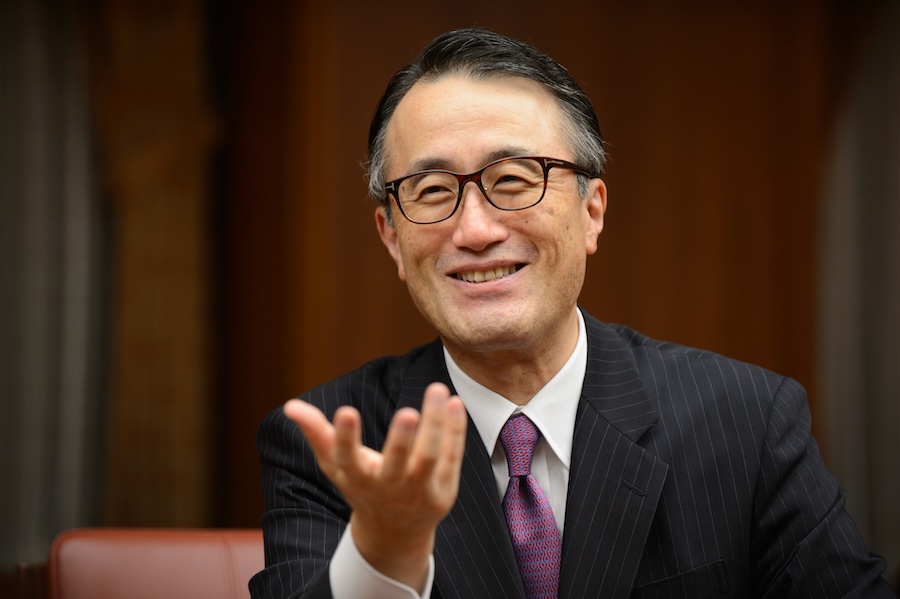
by Editor BGF | Oct 19, 2025 | Shinzo Abe Initiative for Peace and Security, News
The Boston Global Forum is honored to welcome distinguished leaders and thinkers from Japan and Taiwan as featured speakers at its special gatherings on November 3–4, 2025, at Harvard University.
From Japan, the Forum proudly hosts:
- Yasuhide Nakayama, Former State Minister of Japan and Representative of BGF in Japan, who will deliver the keynote “A Decade of the World Leader for Peace and Security Award” and share insights on the Shinzo Abe Initiative and Japan’s leadership in advancing peace and ethical technology governance.
- Kanetsugu Mike, President of Mitsubishi UFJ Financial Group (MUFG Bank), who will deliver the keynote address at the session “Building Trust in AI-Driven Finance,” exploring how ethical and transparent financial innovation can reinforce confidence and collaboration in the global AI economy.
From Taiwan, Mr. Joseph Jye-Cherng Lyu, Chairman of the International Economic Cooperation Association and Former Finance Minister of Taiwan, will deliver a keynote at the session “AIWS Digital Asset Standards Initiative (AIWS-DASI) and Issuing AIWS Esteemed Digital Assets,” focusing on the integration of ethical principles, digital transparency, and responsible governance in the age of AI and blockchain.
Together, these distinguished speakers exemplify the shared commitment of Japan and Taiwan to peace, innovation, and human-centered progress — ideals that define the AI World Society (AIWS) vision.

Kanetsugu Mike, president and chief executive officer of Bank of Tokyo-Mitsubishi UFJ Ltd., speaks during a media roundtable in Tokyo, Japan, on Tuesday, Oct. 3, 2017. Mitsubishi UFJ Financial Group Inc.’s lending arm is seeking acquisitions of about 100 billion yen ($890 million) in Asia and the U.S. to bolster its global operations, Mike said. Photographer: Akio Kon/Bloomberg
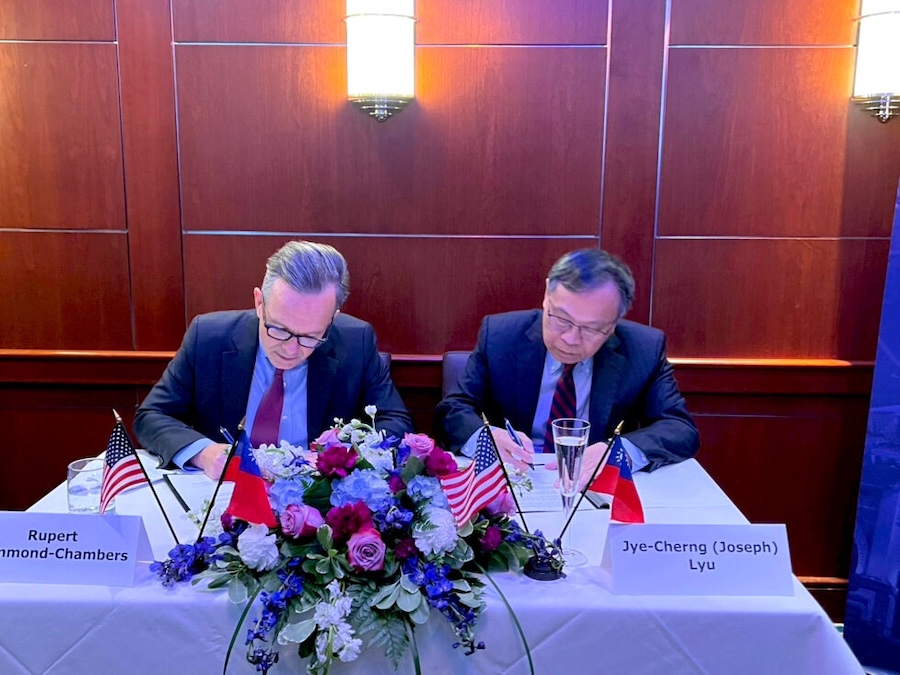

by Editor BGF | Oct 19, 2025 | Global Alliance for Digital Governance
In an era where digital assets are redefining value, ownership, and trust, the AIWS Digital Asset Standards Initiative (AIWS-DASI) seeks to establish a global ethical and quality framework for the digital economy.
Launched by the Boston Global Forum (BGF) — through its pioneering initiative, the AI World Society (AIWS) — this program positions digital assets not merely as financial instruments, but as reflections of knowledge, creativity, human dignity, and social progress.
AIWS-DASI aims to define and certify the ethical, technical, and societal dimensions of digital assets, ensuring they contribute to transparency, sustainability, and the common good. It introduces the concept of AIWS Esteemed Digital Assets, recognizing innovations, works, and achievements that embody the highest standards of integrity and human-centered value.
Through this initiative, BGF and AIWS call on world leaders, scholars, and innovators to collaborate in building a trusted, human-centric digital ecosystem — one that transforms technology into a force for peace, inclusion, and enlightenment in the AI Age.
Please see full here: https://bostonglobalforum.org/publication/the-aiws-digital-asset-standards-initiative-aiws-dasi-2/


by Editor BGF | Oct 12, 2025 | News
Honoring the 2025 Laureate and Advancing a Decade of Global Leadership for Peace and Humanity
Date: November 3, 2025 (Afternoon)
Venue: Harvard University Faculty Club, Cambridge, Massachusetts
The Boston Global Forum (BGF) will host a distinguished ceremony on the afternoon of November 3, 2025, at the Harvard University Faculty Club, to honor the 2025 World Leader for Peace and Security Award recipient.
This year’s celebration marks a major milestone — the 10th Anniversary of the World Leader for Peace and Security Award (2015–2025) — a decade of recognizing exceptional world leaders who have advanced peace, stability, and human dignity through vision, courage, and ethical leadership.
The event will include a special session, “New Ideas for the Award at 10 Years,” gathering members of the BGF–AIWS Family — global leaders, scholars, innovators, and previous award recipients — to discuss the future of the Award and its evolving mission in the Age of Artificial Intelligence.
As the world faces profound technological and geopolitical transformation, BGF aims to enhance and advance the World Leader for Peace and Security Award as a living initiative — one that unites its laureates to collaborate on building a more peaceful, just, and human-centered world.
Through this special occasion, the Boston Global Forum calls upon global resources and collective wisdom to build and realize the AI World Society model, where technology and innovation are guided by ethics, compassion, and the enduring values of humanity — elevating the human being to a higher level of consciousness and development.

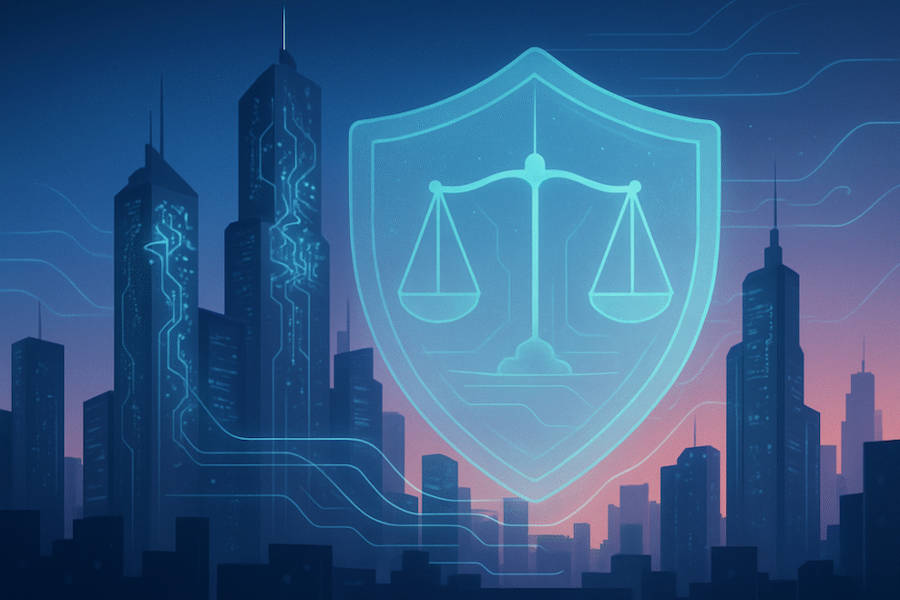
by Editor BGF | Oct 12, 2025 | News, Shaping Futures
October 10, 2025 — Sacramento, CA — Governor Gavin Newsom has signed Senate Bill 53 (SB 53), the Transparency in Frontier Artificial Intelligence Act (TFAIA), establishing the United States’ first comprehensive framework for AI safety, transparency, and accountability.
The law requires developers of powerful AI systems to disclose safety frameworks, assess catastrophic risks, and report serious incidents within strict deadlines. It also mandates transparency in AI training data and AI-generated content.
The Boston Global Forum (BGF) commends California’s leadership, noting that this act reflects the spirit of the AI World Society (AIWS) — ensuring technology development aligns with ethics, public trust, and human security.
BGF calls on democratic nations to follow California’s example by embedding AI transparency, accountability, and human values into law — advancing a global framework for responsible AI governance.
https://markets.financialcontent.com/stocks/article/tokenring-2025-10-10-california-unleashes-nations-first-comprehensive-ai-safety-and-transparency-act

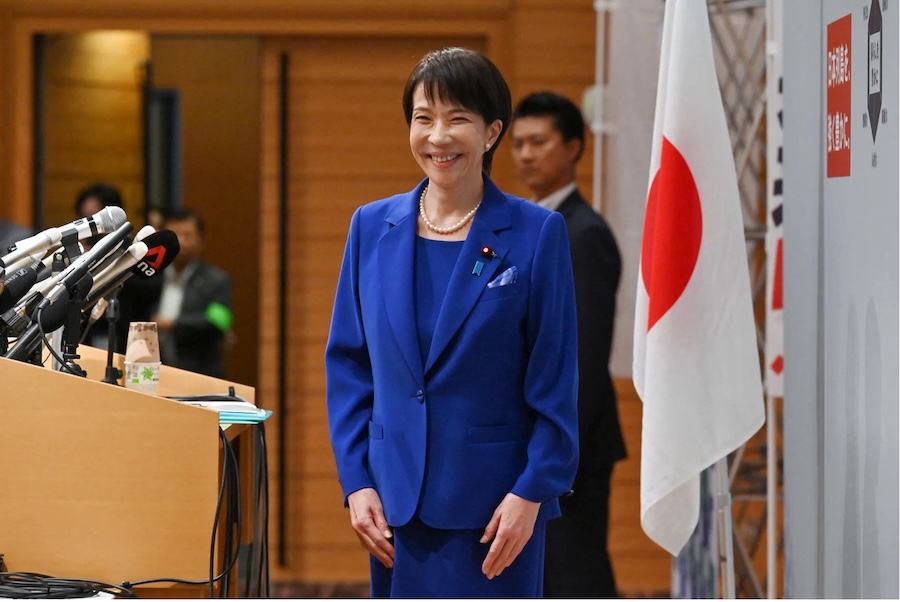
by Editor BGF | Oct 12, 2025 | Shinzo Abe Initiative for Peace and Security, News
Washington/Tokyo, October 7, 2025 — U.S. President Donald Trump congratulated Sanae Takaichi, newly elected President of Japan’s ruling Liberal Democratic Party (LDP) and Japan’s incoming Prime Minister, praising her “great wisdom and strength” and calling her election “tremendous news for the incredible people of Japan.”
President Trump reaffirmed his commitment to deepening the U.S.–Japan alliance, expressing full support for Ms. Takaichi’s leadership and vision for a Free and Open Indo-Pacific. He emphasized that the United States and Japan “will continue to work side by side to ensure peace, prosperity, and security across the Indo-Pacific region.”
Ms. Takaichi, who is expected to be formally confirmed as Japan’s first female Prime Minister following the parliamentary vote, responded warmly, expressing her determination to strengthen the alliance and cooperation with the United States.
The Japan–U.S. Summit is expected to take place on October 28, 2025, in Tokyo, during President Trump’s late October visit — his first official trip to Japan since returning to the White House.
The Boston Global Forum (BGF) warmly congratulates Sanae Takaichi, recipient of the 2023 World Leader in AIWS Award, whose leadership reflects wisdom, ethics, and human-centered innovation in the AI Age. BGF also welcomes the renewed U.S.–Japan partnership as a foundation for peace, security, and responsible technological progress in the Indo-Pacific.
https://www.japantimes.co.jp/news/2025/10/07/japan/politics/trump-hails-takaichi-pm/
https://www.nippon.com/en/news/yjj2025100700755/
https://www.reuters.com/world/asia-pacific/trump-congratulates-woman-set-be-first-female-prime-minister-japan-2025-10-06/


by Editor BGF | Oct 12, 2025 | World Leader for Peace and Security, News, World Leaders in AIWS Award Updates
For a decade, the Boston Global Forum (BGF) has honored exceptional world leaders who have advanced peace, security, and human dignity through vision, courage, and ethical leadership. As we celebrate this milestone, we reflect on the profound legacy of those honored and look ahead to a future where moral leadership and artificial intelligence together shape a more enlightened world.
Honorees (2015–2025)
- 2015: Prime Minister Shinzo Abe (Japan); Chancellor Angela Merkel (Germany)
- 2016: UN Secretary-General Ban Ki-moon
- 2017: President Toomas Hendrik Ilves (Estonia)
- 2018: President Sauli Niinistö (Finland)
- 2019: President of WLA–Club de Madrid, former President Vaira Vīķe-Freiberga
- 2020: President Ursula von der Leyen (European Commission)
- 2021: President Sauli Niinistö (Finland)
- 2022: President Volodymyr Zelenskyy and the People of Ukraine
- 2023: Amma (Mata Amritanandamayi)
- 2024: President Emmanuel Macron (France)
- 2025: To be announced at the Harvard University Faculty Club, November 3, 2025
New Ideas for the Award at 10 Years: Building the Next Generation of Ethical Leaders for the AI Age
At this historic anniversary, the Boston Global Forum and the AI World Society (AIWS) will introduce new directions to elevate the Award for the coming decade—ensuring it continues to inspire moral courage and ethical innovation in an era defined by artificial intelligence and global transformation.
1. World Leader Laureates for Peace and Humanity
A new world alliance of laureates—past recipients of the Award—who will collaborate to address urgent global challenges such as AI governance, disinformation, climate resilience, and conflict prevention. This initiative will unite visionary leaders to act as moral compasses, guiding the use of technology and policy toward peace, dignity, and cooperation.
2. Inspiring and Educating Future Leaders
Encourage young leaders worldwide to learn from the values, experiences, and achievements of the World Leader Laureates for Peace and Humanity, and to apply the principles of the AI World Society (AIWS) in their own communities. Through mentorship, learning exchanges, and collaborative projects, these future leaders will help realize AIWS—transforming its ideals into real-world action for peace, ethics, and human-centered innovation.
3. Ethical Impact Dossier
An annual, transparent report documenting measurable outcomes from Award-related initiatives—showcasing how leadership inspired by AIWS principles advances human-centered progress and ethical global governance.
Together with its laureates, partners, and the BGF-AIWS Family, the Boston Global Forum will carry this legacy forward—uniting moral leadership with intelligent innovation to build a safer, more just, and more compassionate world.

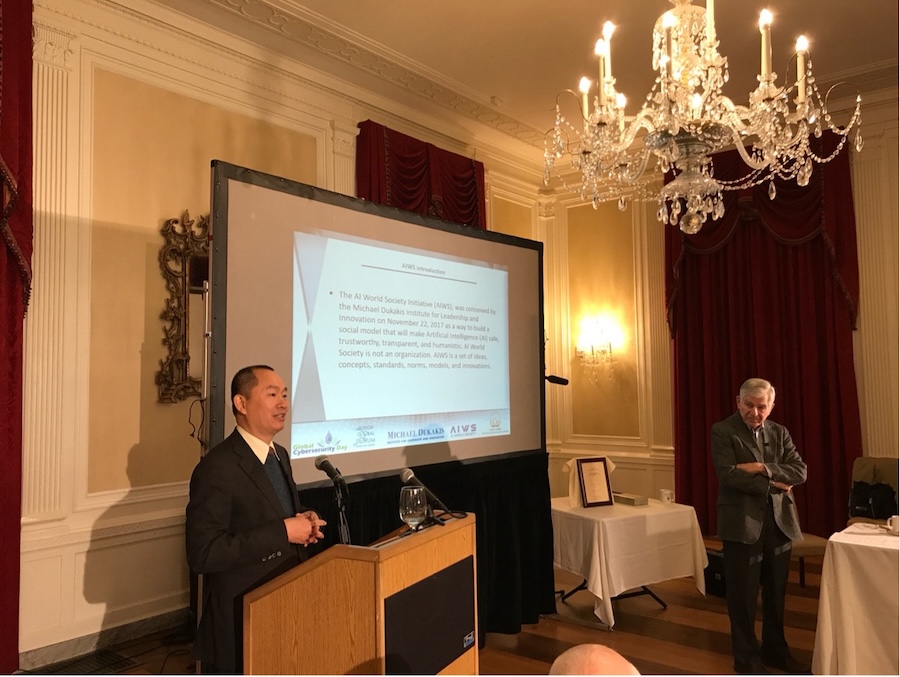
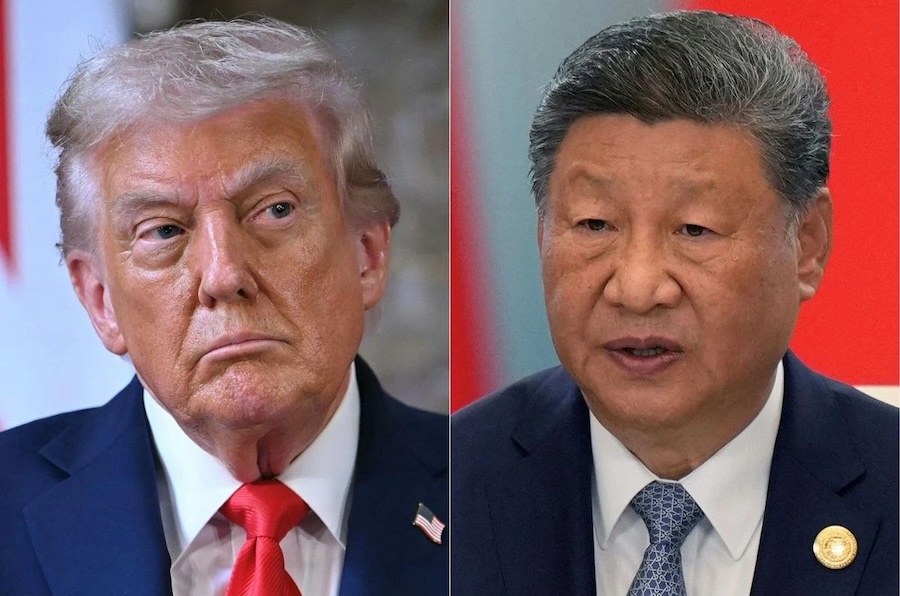
by Editor BGF | Oct 12, 2025 | News
Boston, October 12, 2025 — The Boston Global Forum (BGF) notes President Donald Trump’s announcement of an additional 100% tariff on Chinese imports, following China’s decision to restrict exports of critical rare earth elements essential to advanced technologies, renewable energy, and defense systems.
The BGF recognizes that President Trump’s response reflects a necessary and strategic reaction to escalating economic and geopolitical threats from China, which has long leveraged resource dominance to shape and influence global supply chains.
While decisive countermeasures are justified to safeguard national interests and economic resilience, BGF emphasizes that enduring peace and stability demand a framework rooted in ethical competition and responsible technological cooperation, aligned with the principles of the AI World Society (AIWS).
The Boston Global Forum calls upon democratic nations to deepen coordination through the Global Alliance on AI and Digital Governance, ensuring that technological advancement and trade policies are grounded in transparency, fairness, and mutual respect — preventing the weaponization of innovation and resources in the AI Age.
https://www.bbc.com/news/articles/cn4wkd7729po
https://www.ft.com/content/328e3195-909a-45fb-b118-9dafbd41262b













